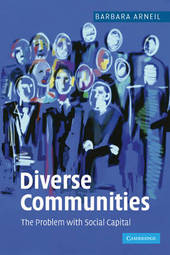
|
Diverse Communities: The Problem with Social Capital
Paperback / softback
Main Details
| Title |
Diverse Communities: The Problem with Social Capital
|
| Authors and Contributors |
By (author) Barbara Arneil
|
| Physical Properties |
| Format:Paperback / softback | | Pages:280 | | Dimensions(mm): Height 229,Width 152 |
|
| ISBN/Barcode |
9780521673907
|
| Classifications | Dewey:302 |
|---|
| Audience | | Professional & Vocational | |
|---|
| Illustrations |
Worked examples or Exercises
|
|
Publishing Details |
| Publisher |
Cambridge University Press
|
| Imprint |
Cambridge University Press
|
| Publication Date |
14 September 2006 |
| Publication Country |
United Kingdom
|
Description
Diverse Communities is a critique of Robert Putnam's social capital thesis, re-examined from the perspective of women and cultural minorities in America over the last century. Barbara Arneil argues that the idyllic communities of the past were less positive than Putnam envisions and that the current 'collapse' in participation is better understood as change rather than decline. Arneil suggests that the changes in American civil society in the last half century are not so much the result of generational change or television as the unleashing of powerful economic, social and cultural forces that, despite leading to division and distrust within American society, also contributed to greater justice for women and cultural minorities. She concludes by proposing that the lessons learned from this fuller history of American civil society provide the normative foundation to enumerate the principles of justice by which diverse communities might be governed in the twenty-first century.
Author Biography
Barbara Arneil is Associate Professor in the Department of Political Science at the University of British Columbia. She won the Harrison Prize for the best article published in Political Studies in 1996 and is the author of Feminism and Politics (1999) and John Locke and America: A Defense of English Colonialism (1996).
Reviews"For Arneil, social capital is not neutral, nor does it have only positive outcomes. Like other social capital theorists, such as Pierre Bourdieu, she sees it as another means for the powerful to protect their interests...Arneil's much more complex and exacting challenge to us in Diverse Communities is to build a just society in which everyone truly belongs and everyone can fully participate and flourish." Tim Broadhead, Literary Review of Canada "What sets Arneil's book apart from other multicultural and feminist critiques of Bowling Alone is the way in which she uses her re-interpreted history of American civil society to point toward alternative regulatory principles of civic engagement for an increasingly multicultural America... an important contribution toward conceiving a form of communal belonging that will also respond to people's desires for cultural distinctness, mutual respect, and meaningful membership." Scott Mclean, Quinnipiac University,Political Science Quarterly
|